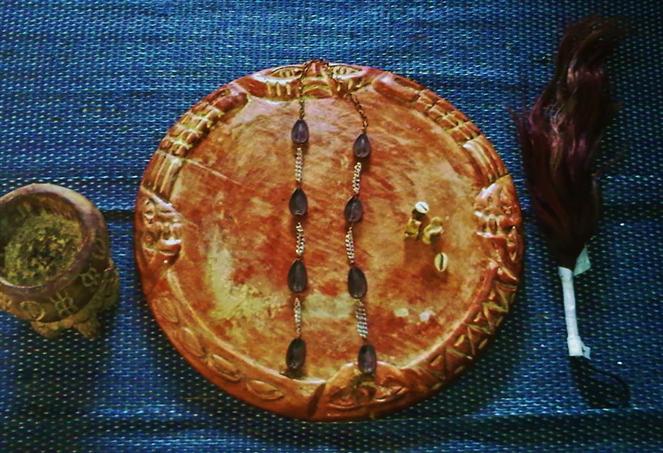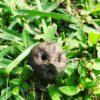‘Òwe ni Ifá ípa, òmòràn ni ìmò ó’
Ifá always speaks in parables;
It is a wise man who understands his words.
Orunmila was the very first Ifa diviner, the first Babalawo (father of mysteries or secrets, a teacher), who came from heaven to earth as part of the 17 original irunmole that Olodumare/Eledumare sent down from heaven. He was given the knowledge of Olodumare which is encoded into the 256 odus of Ifa: the word of Ifa is the word of God, and it covers every possible calamity of humankind and how to avoid them, how to live well and in peace. These trials can come through our own choice of destiny, and also by our own actions or in-actions. It is only Orunmila who knows our destiny as shown by the praise name ‘The Eyewitness of Destiny, Ẹlérìí Ìpín’. He is also known as ‘The historian of Ifè land’, Òpìtàn Ilè Ifè, Ife being the first area that the irunmole came down from heaven. Orunmila was made the leader of the deities while on earth, before he returned to orun.
Orunmila walked the length and breadth of Yorubaland and also traveled to neighboring communities like Tapa land, (Tiv tribe), in the middle belt part of Nigeria. Before leaving each place, he ensured that he had trained and taught one or more students in the oracle of Ifa, as well as ensuring they could perform healings, divination consultations and knew by heart the gospel of Ifa before he left. This is no easy task, as up until this day it is considered to take at least 12 years to learn well the complete set of knowledge which encompasses not only being able to recite, from memory, all 256 odus and their thousands of verses, but also know the proper sacrifices, songs, and herbal medicine for each one of those verses. He is known as ‘Akerefinusogon’, the small man of stature yet large in wisdom.
Olodumare placed Orunmila here on earth to intercede for humans, to teach us how to co-exist peacefully, to act as a mediator between humans, the orisa and our ancestors, to resolve the many problems which face us as humans. He was an example who walked this earth, trying to instill in humans the basics of iwa pele, good character, and for us to be able to harvest the fruits that correct behavior brings. Ifa says he reincarnated many times, and is yet to come back to earth in another reincarnation to bring about a new era of truthfulness, sincerity, honesty and purity of heart.
Many stories abound of how Orunmila came by his knowledge of divination using the 16 four-eyed palm nuts called ikin; some say it was Esu who taught Orunmila the art, others say he was taught in heaven. Regardless, he holds the wisdom of the 256 odus and all the verses within those odus which contain the remedies for every situation and ailment known to humankind. Truly, not even death can stand up to the mastery of Orunmila (or an able Babalawo)! Aided by Esu, he (and all Babalawo priests), uses Esu’s eyes and powers as Esu moves freely between orun and aiye seeing all that pertains to our human lives and how he can better them.
This union of Orunmila and Esu is represented by the eyes and face of Esu always carved into the wood of the opon divining board at the 12 o’clock position opposite the position where the Babalwao sits. When the Babalawo first chants ‘Iwaju Opon o gbo’, “front of the tray you have heard the client’s request”, he is speaking to Esu and asking Esu’s consent to carry out the divination. Also telling, is that any money offered at the beginning of divination is not in payment of the Babalawo priest but actually an offering to Esu, who is always paid, and paid first, even if just a few coins or naira. Esu watches and bears witness to the divination being performed and he is also the keeper of the ase, the divine authority without which nothing would come to fruition by Orunmila or any Babalawo who practices! It is Esu who presides side by side with Orunmila over divination and it is Esu who allows Orunmila to see into the past, present and future. It is Orunmila who has the mastery and wisdom to decipher and sort out the necessary sacrifices, appeasements and carry them out in the world of humans. Esu carries these sacrifices between heaven and earth, making sure that all is done according to the letter lest the sacrifice fail.
Every Babalawo priest who walks this earth is a representation of Orunmila himself and his role is to help us redeem our lives here on earth, to find peace and satisfaction. They are expected to embody the ethics, values and morals befitting of the King, as Orunmila himself is also viewed as a King here on earth and in heaven. In fact, when Orunmila came to earth he wore a crown, and this crown was the first instrument used in divination to further the happiness of humans on earth. It was only later that he ‘traded’ his crown to a King of earth who had need to be publicly recognized.
“Emi Oba logboogba,Oba ndade, mo gbede borun.”
“The king and I are equal, The king wears the Crown,
I wear the long bead necklace (ide),
The King and I are equal.”
Another method of divination was needed on earth so that more Babalawo could help the suffering people and give them the healing and aligning powers of Ifa, the spoken and divine word of God. The Ope tree was then initiated into Ifa and bore the fruit which became the instrument of divination til this day.
LINEAGE APPRAISAL OF ORUNMILA BABA AGBONMIREGUN
Orunmila Baba Agbonmiregun
Orunmila, the Father, the brave one that makes prayers manifest
Okurin dudu ti gbe oke Igeti
The black short man that lived in Igeti valley (Ekiti State)
A tun ori eni ti ko sunwon se
The one that help mankind prevail to their destiny
Odudu ti du ori Eleku
The one that protected the head of the mouse owner from evil
Odudu ti du ori Eleja
The one that protected the head of the fish owner from evil
Odudu ti du ori Elere
The one that protected a child from untimely death, against the evil cult
Oba ti nfi Oba je
King that crowns another king with power
Igba keji Orisa
The deputy of Ifa oracle
Ifa omo Enire Ifa
The son of the great one
Ifa omo Enire Ifa
The son who spreads blessings
Ifa omo Enikan Saka bi Agbon
The son of ones who are smart as wasps
Ewi nle Ado
The decider of Ado town (Ado-Ekiti)
Orisa n’deta
The only oracle in Ideta town
Erinmi lode Owo
The chief Erinmi of Owo town (Ondo State)
Mapo Elere
The messiah of Mapo Elere town
Maba Otun
The rescuer of Maba Otun town (Ondo state)
Gbola jokoo omo okuku ti merin erin fon
One that is seated surrounded by wealth, and makes the trumpeting of the Elephant
Omo opolopolopo imo tit u jiajia yo wodi
The son of many professions that flows strong and high as a stream flowing becoming a river
Omo Asese yo ogomo tii fun ningin ningin
The son that appears shining like a fresh leaf bud
Omo Ejo Meji tii sare ganranganran lori erewe
The son of two snakes that runs fastest on the fallen leaves
Omo ina joko mo joorun
The son of a burning forest which does not blot out the sun
Omo ina joko mo je eluju
The son of a burning forest which does not harm the young palm seed tree
Ifa pele omo Enire
Ifa we praise the son of who gives blessings
Ifa pele omo Enikan Saka bi Agbon
We praise the son of the one clever like a wasp
Ifa pele Orisa Oko Aje
Ifa we appraise you, the oracle that married Aje (goddess of wealth)
Ifa pele Orisa Oko Osun
Ifa we appraise you, the oracle that married Osun (River goddess)
Ifa pele o, Omo Orisa kan Orisan kan ti afisin eye ti ori oko ti afi sin eye
If we praise you, the only oracle that can make a bird fly away without throwing a stone
Ifa pele o, Omo Olope ba n owo biwo
Ifa we appraise you, the only owner of Ope seed that produced money
Ifa pele o, Omo Olope ba n bimo
Ifa we praise you, the only owner of Ope seed that gives child
Omo Olope kan Ope kan ti se ewe jiajia lori igi
The son of Ifa that makes the breeze on the Ope tree to make it strong
A kere finu se ogbon
One that is very small with quick wisdom
Opitan Ife tin je Agbo
The historian of Ife town that likes to eat rams meat
Baba komo loro bi iye kan eni
The Father that teaches/gives every child nourishment though not their relative
Baba afi edefeyo
The Father that uses his speech to recite proverbs from Ifa.
Devotees of Orunmila (women can also be initiated into the order but usually do not divine using ikin, only opele or cowries, but some do use ikin), usually have a corner of their home dedicated to the priest diviner. The ‘hand of Ifa’ consisting of a quantity larger than 16 palm nuts is kept in a covered dish, usually set on top the wooden opon and both on top of a type of platform as befitting a King’s throne. There can also be an ajere, a wooden bowl carved specifically for just the 16 four-eyed ikin used in divination; a cow or horse tail switch called an iruke or irukere; a carved rattle or tapper with Esu’s likeness or that of a kneeling man or woman, called an iroke, and used to awake Esu and the spirit world; iyerosun powder to spread on the divining board and mark the odus as they are discovered and usually a quantity of cowrie shells. The ikin are fed on certain days and enjoy offerings of liquor, shea butter, dried rat, orogbo, obi, and other treats. The ikin are viewed as the body of Orunmila himself, as all diviners have a need for food and drink, so do the ikin in order to work well at the service of humankind.
© 2016 by Farin da Silva, All Rights Reserved. Pursuant to the Copyright Act of 1976 and subsequent amendments, codified as 17 U.S.C. §§ 101-810, the works contained within are protected by United States laws and by international treaties. This includes the literary and pictorial works created by Farin da Silva contained herein, as well as any other original works of authorship fixed in any tangible medium of expression. The unauthorized copying, distributing, displaying, or production of derivative works is strictly prohibited by Farin da Silva. Copyright infringement may subject you to civil liability of a minimum of $750 per infringement for statutory damages, as well as the costs incurred to enforce these rights. 17 U.S.C. § 504. A court may award up to $150,000 per infringement. This copyright holder takes copyright infringement seriously and does enforce their rights.
Photo courtesy of Babalawo Akin Alapo Opele





